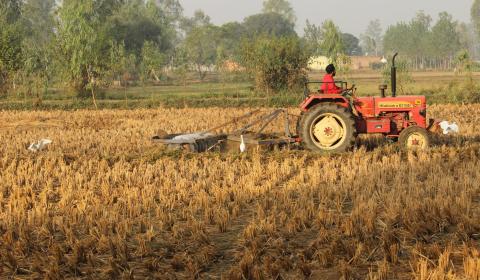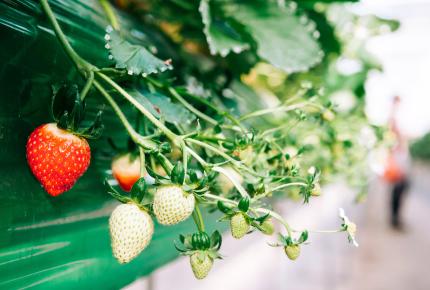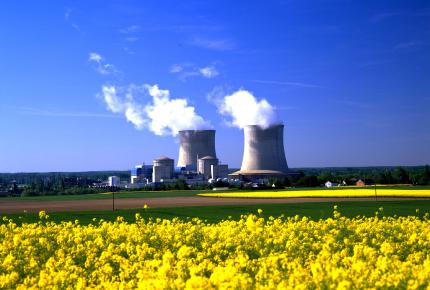
EATING GREEN: BOOSTING SUSTAINABILITY IN THE FOOD INDUSTRY
World leaders are currently gathered at the COP 26 summit with a clear objective in mind. They aim to accelerate action toward the goals laid out in the Paris Agreement and the United Nations (UN) Framework Convention on Climate Change. The priority is to create an action plan for achieving global net zero. Additionally, they are exploring ways to reform global trade in agricultural commodities, such as beef, soy and palm oil, so that sustainable production is rewarded. Identifying ways to help farmers make a better living, leaders must at the same time ensure protection of the planet’s forests, ecosystems and biodiversity.
REDUCING EMISSIONS ACROSS THE BOARD
The food industry generates over 25% of the world’s greenhouse gas (GHG) emissions[1], and it is one of the primary culprits of deforestation. In light of this, its major players are increasingly taking steps to improve the sustainability of their sector across the entire value chain – both in terms of environmental and social impacts. The industry is seeing a push toward new technologies, modernized production methods and regulation and reduced consumption, with ambitious initiatives targeting both upstream and downstream companies.
The EU Farm to Fork strategy, for example, aims to transform how food will be produced and sold across the bloc and is a central pillar of the European Green Deal, designed to make Europe the first climate-neutral continent by 2050. The strategy’s wide-ranging proposals include 27 actions covering the entire food value chain. Going beyond borders, the One Planet network’s Sustainable Food Systems Programme, launched in 2015, is a partnership of government agencies, civil society organizations, research and tech institutions, UN agencies, and other international and private sector organizations. Their various programs support countries in the shift to sustainable consumption and production.
THE RISE OF REGENERATIVE AGRICULTURE
Regenerative agriculture takes a conservation and rehabilitation approach to the food system by using technologies to improve and revitalize the soil and environment. Having grown in popularity in recent years, it is now seeing initiatives cropping up worldwide. Examples include:
- Cargill RegenConnect™, which links farmers to the emerging carbon marketplace and helps scale the voluntary adoption of regenerative agriculture practices. Its latest program pays farmers for improved soil health and positive environmental outcomes.
- Positive Agriculture, an ambition by PepsiCo that aims to eliminate at least 3 million tons of GHG emissions by 2030. It works to achieve this through various initiatives driven by its brands. For instance, the Walkers brand in the UK has launched a ‘circular potatoes’ technology to manufacture low-carbon, nutrient-rich fertilizer using potato peelings.
- The Agoro Carbon Alliance (owned by fertilizer company Yara) and the Cool Farm Alliance form part of a growing crop of food manufacturer-backed initiatives that have emerged to help farmers adopt climate-positive practices. These include cutting GHG emissions and limiting pesticides to reduce the effects on biodiversity.
WHAT ABOUT WASTE?
The EU defines waste as food and inedible parts of food removed from the food supply chain that are to be disposed of or used for nutrient recovery or energy generation. According to the UN’s Food and Agriculture Organization, one third[2] of the world’s food production is lost or wasted, and over half of that waste occurs before food even reaches the consumer’s plate. During production, losses can be incurred due to damage through factors like poor handling and incorrect storage conditions. Food can also be lost at the processing stage through contamination, or during distribution as a result of a lack of cooling or storage facilities. When it ends up on landfill, rotting food produces methane, an even more harmful GHG than carbon dioxide (CO2)[3].
Much of this waste can be avoided by companies adopting a more circular economy business model, of which reuse, recycling and recovery are key tenets. This means exploring food waste reuse pathways, upcycling material into high added-value products, and recovering energy. In the US, the food industry-led Food Waste Reduction Alliance works to increase food donations and recycling of unavoidable food waste in manufacturing, retail and hospitality. Meanwhile, Germany-based startup Invisible Foods uses AI to track and analyze perishable foods, then matches products with the right buyers according to quality levels.
This year, the International Organization for Standardization (ISO) has commenced work on standardization of food loss and waste to provide a framework for organizations throughout the food value chain to measure and reduce it.
HOW TO REDUCE FOOD WASTE THROUGHOUT THE VALUE CHAIN
PROVIDING PROOF
As well as protecting the planet, responsible food players reduce their risk of non-compliance and boost their reputation among consumers and stakeholders. However, to enjoy these benefits fully, food companies need to generate comprehensive corporate sustainability reports that take into account everything from suppliers and logistics to external services purchased, and cover all three emissions scopes as defined by the GHG Protocol.
Sustainability reports are rapidly becoming required publications for companies around the world—due both to regulations and to demand from investors, consumers and employees. The EU was one of the first movers in terms of regulating[4] to provide clarity among the plethora of voluntary reporting standards, stipulating already that large public-interest companies with more than 500 employees publish non-financial reports on their sustainability risks and impacts. It requires that the information is accurate and transparent, and compliance must be verified by an independent third party. The EU’s Corporate Sustainability Reporting Directive looks set to take this a step further, expanding the requirement to 49,000 companies across the bloc by 2023.
VERIFYING YOUR SUSTAINABLE PRACTICES
Bureau Veritas offers a range of certification services to help companies deliver safe, high-quality food, and ensure and demonstrate sustainable practices throughout the value chain.
Certification programs such as the Global Food Safety Initiative (GFSI) standards help clients achieve compliance across the entire supply chain. Meanwhile, industry-specific certification programs, such as the Aquaculture Stewardship Council (ASC) Farm, the Marine Stewardship Council (MSC) Fishery, and Best Aquaculture Practices (BAP) for seafood, ensure they meet industry standards. Bureau Veritas also builds animal welfare audit programs according to companies’ specific needs.
Our customized audits help organizations address specific food challenges, such as demonstrating responsible sourcing practices. In addition, Bureau Veritas performs certification of sustainability labels for schemes such as Forest Stewardship Council® for timber and forest products, International Sustainability and Carbon Certification for biofuels and ISCC PLUS for biomaterials. Roundtable on Sustainable Palm Oil (RSPO) certification enables companies to demonstrate that the palm oil in their products is sourced responsibly, and organic certification such as EC 848/2018 shows compliance with sustainability and animal welfare standards, and that products are free from harmful substances such as hormones and pesticides. We can also certify social accountability (SA8000), environmental (ISO 14001), and energy (ISO 50001) management systems and verify GHG emissions data, among other services within the Corporate Responsibility & Sustainability portfolio.
These services are an integral part of Bureau Veritas’ Circular+ offer, designed to help companies move toward a circular economy model, reduce their environmental footprint throughout the value chain, and implement more sustainable business practices.
Companies can also show the measurable impact of initiatives by partnering with Bureau Veritas. Through BV Green Line services and solutions, we help demonstrate the transparency and trustworthiness of organizations’ sustainability actions.

